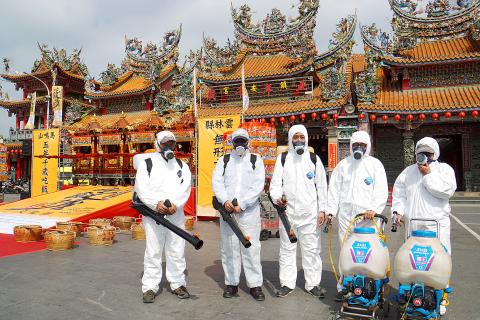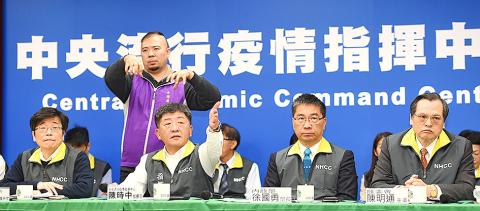From today, all Chinese nationals are banned from entering Taiwan, while people who have traveled to China, Hong Kong or Macau in the previous 14 days are to be put under mandatory home quarantine for 14 days after returning to Taiwan, the Central Epidemic Command Center announced yesterday.
The only exception would be people who travel to Hong Kong or Macau after obtaining the government’s permission, who would be “asked to perform mandatory self-care management after returning to Taiwan,” said Minister of Health and Welfare Chen Shih-chung (陳時中), who also heads the center.
The center designated China as a secondary epidemic area for the 2019 novel coronavirus (2019-nCoV) outbreak, while the Mainland Affairs Council issued a “red” travel advisory — its highest level, meaning “do not visit” — for China and a “yellow” travel advisory — meaning “reconsider visiting” — for Hong Kong and Macau.

Photo: Chan Shih-hung, Taipei Times
Taiwan had no new confirmed 2019-nCoV infections yesterday, Chen said, but added that two Taiwanese evacuees from Wuhan, the Chinese city at the epicenter of the outbreak, showed mild respiratory symptoms and were quarantined at a hospital for further examination.
“However, confirmed cases of 2019-nCoV in China continue to increase rapidly and many areas in China have imposed travel bans or restrictions,” he said. “The whole of China has become an epidemic area.”
Mainland Affiars Council Minister Chen Ming-tong (陳明通) said that Taiwanese who travel to China despite the agency’s travel warning would be quarantined at home for 14 days when they return.

Photo: Liu Hsin-de, Taipei Times
The council in a news release said that 19 of China’s 31 provinces and cities had reported more than 100 confirmed cases of 2019-nCoV, including clustered infections in local communities in Beijing and Shanghai.
Confirmed cases in Hong Kong and Macau have also continued to increase in the past few days, the council said, urging people to remain cautious and reconsider traveling to the two territories.
Minister of the Interior Hsu Kuo-yung (徐國勇) said that people placed under mandatory home quarantine should practice self-discipline and observe the restrictions, adding that those whose breach quarantine would be dealt with according to the Communicable Disease Control Act (傳染病防治法), the Social Order Maintenance Act (社會秩序維護法) and the Criminal Code.
“Local civil administrations, including borough and village wardens, are to cooperate with local health departments by finding people who lose contact with officials during quarantine,” he said. “If such people cannot be found, the police would step in to conduct a search.”
“Police will implement measures employed when solving major criminal cases when searching for such people,” Hsu said.
People with a fever who take antipyretics to reduce their body temperature or provide false information in the Novel Coronavirus Health Declaration Card upon their arrival in Taiwan would also face fines or other punishment for contravening the Social Order Maintenance Act and the Criminal Code, he said.

DAREDEVIL: Honnold said it had always been a dream of his to climb Taipei 101, while a Netflix producer said the skyscraper was ‘a real icon of this country’ US climber Alex Honnold yesterday took on Taiwan’s tallest building, becoming the first person to scale Taipei 101 without a rope, harness or safety net. Hundreds of spectators gathered at the base of the 101-story skyscraper to watch Honnold, 40, embark on his daredevil feat, which was also broadcast live on Netflix. Dressed in a red T-shirt and yellow custom-made climbing shoes, Honnold swiftly moved up the southeast face of the glass and steel building. At one point, he stepped onto a platform midway up to wave down at fans and onlookers who were taking photos. People watching from inside

A Vietnamese migrant worker yesterday won NT$12 million (US$379,627) on a Lunar New Year scratch card in Kaohsiung as part of Taiwan Lottery Co’s (台灣彩券) “NT$12 Million Grand Fortune” (1200萬大吉利) game. The man was the first top-prize winner of the new game launched on Jan. 6 to mark the Lunar New Year. Three Vietnamese migrant workers visited a Taiwan Lottery shop on Xinyue Street in Kaohsiung’s Gangshan District (崗山), a store representative said. The player bought multiple tickets and, after winning nothing, held the final lottery ticket in one hand and rubbed the store’s statue of the Maitreya Buddha’s belly with the other,

‘NATO-PLUS’: ‘Our strategic partners in the Indo-Pacific are facing increasing aggression by the Chinese Communist Party,’ US Representative Rob Wittman said The US House of Representatives on Monday released its version of the Consolidated Appropriations Act, which includes US$1.15 billion to support security cooperation with Taiwan. The omnibus act, covering US$1.2 trillion of spending, allocates US$1 billion for the Taiwan Security Cooperation Initiative, as well as US$150 million for the replacement of defense articles and reimbursement of defense services provided to Taiwan. The fund allocations were based on the US National Defense Authorization Act for fiscal 2026 that was passed by the US Congress last month and authorized up to US$1 billion to the US Defense Security Cooperation Agency in support of the

‘COMMITTED TO DETERRENCE’: Washington would stand by its allies, but it can only help as much as countries help themselves, Raymond Greene said The US is committed to deterrence in the first island chain, but it should not bear the burden alone, as “freedom is not free,” American Institute in Taiwan Director Raymond Greene said in a speech at the Institute for National Defense and Security Research’s “Strengthening Resilience: Defense as the Engine of Development” seminar in Taipei yesterday. In the speech, titled “Investing Together and a Secure and Prosperous Future,” Greene highlighted the contributions of US President Donald Trump’s administration to Taiwan’s defense efforts, including the establishment of supply chains for drones and autonomous systems, offers of security assistance and the expansion of